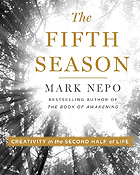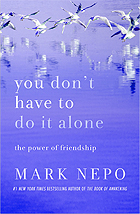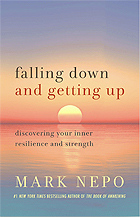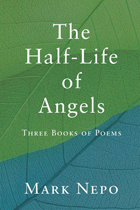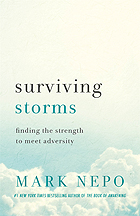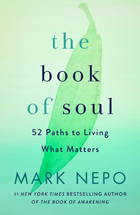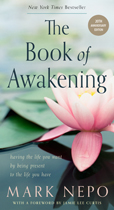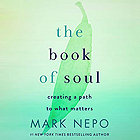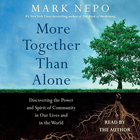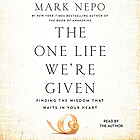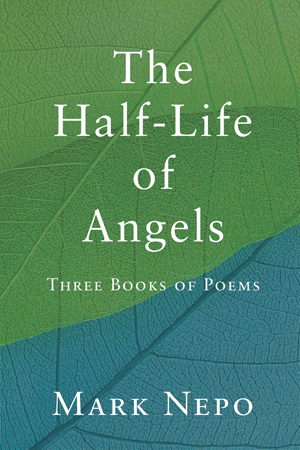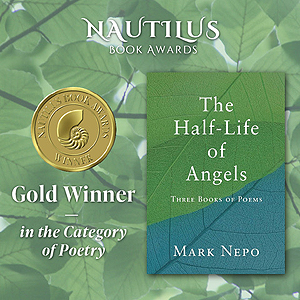| poetry |  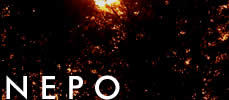  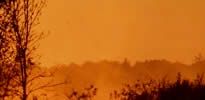 |
|
THE HALF-LIFE OF ANGELS PUBLISHED BY FREEFALL BOOKS "What a beautiful journey this book is. I was moved in some places beyond what I can adequately convey. Mark's capacity to speak such universal truths through poetry is stunning. He is a master." Order from an online bookseller:
MARK'S BOOK THE HALF-LIFE OF ANGELS
Reviews "Mark Nepo has a great heart. His poems are good company." "Mark Nepo joins a long tradition of truth-seeking, wild-hearted poets - Rumi, Walt Whitman, Emily Dickinson, Mary Oliver - and deserves a place in the center of the circle with them." "These poems touch the soul, reminding each of us what it means to be fully alive, to be surrounded by what is sacred. Allow them to reach under your skin, to where mystery is born into meaning." "Words placed so deliberately yet freely on the page, like Chinese brush strokes on silk ... Nepo expresses truth ... in words that inspire and uplift in a sustainable way." "Brilliant, profound and accessible, [Nepo's] poems are like precious treasures rising from the deep, glistening reminders of what really matters." "Nepo is an inveterate meaning-maker who has delved deeply into the wisdom traditions and the world's religions. In vivid imagery, he captures those connections and epiphanies which illuminate the human condition." Everyone will get something from this book, but what you get will depend upon where you are in your growth at the time of the reading. I found I read it as one person and completed it as another. More compassion, more understanding, forgiveness, and no tools. There are no tools to use or exercises you must practice every day for the rest of your life. NO, that is not Mr. Nepo's style, you get what YOU need based on who you are now - that said, all you need to do is read the book. Really take it in. Savor it. It's so easy, I doubt anyone who has read it in its entirety would walk away unchanged.
BOOK DESCRIPTION "Now in my seventies, I am committed to putting my life's journey with poetry in order. The result will be the publication of several volumes of poetry. The Half-Life of Angels is the first of these volumes. I confess that reading through fifty years of poems has been like stepping through holy sites and ruins in order to map the learnings of all my former selves. As any poet, I gather these poems as a way to retrieve a deeper, more ancient knowledge that transcends any one self. And yet, such knowledge can only surface through an authentic self. All these expressions have shaped who I am." — Mark EXCERPTS THE GREAT WATERS In the beginning, I thought I was UNDER THE TEMPLE The temple hanging over the water is PRAYING I WILL FIND I used to have so many plans, good plans, I used to pride myself on how I could get Eventually, the call of life, unexpected Now, like an emperor undressed by time,
A CONVERSATION WITH MARK ABOUT HIS NEW BOOK OF POETRY, THE HALF-LIFE OF ANGELS: THREE BOOKS OF POEMS QUESTION: You speak about poems as teachers. Can you explain this? QUESTION: The poems you are gathering at this time of your life span almost fifty years. What differences do you notice between your early work and your more recent work? The truth is that I have no interest in leaving a trail of polished gems. I can't pretend that I have always perceived as I do now, or that I have always expressed myself as simply or clearly as I do now. So, rather than try to perfect each expression, I have tried to stay true to the developmental voice of each poem, honoring the inner evolution of one spirit in one body in its time on Earth. For the arc of a person inhabiting their full humanness in relation to others and the living Universe is the dynamic poem of a lifetime. All this to say that in my early work, I would trip into the deep and be completely captivated with a glimpse of what was suddenly in view. Like a marine biologist, I would chronicle the entire dive, culminating with the bit of truth I would find along the bottom. There is nothing wrong with these poems or with this form of inquiry. But it made me realize that now, I live in the deep. And so, my later poems are written through the lens of that depth. I am no longer bringing treasure up to you, but inviting you to risk entering the deep with me. The treasure is in living in the deep. This is the reward of all poetry. QUESTION: This book gathers poems around the theme of "sacred becoming." What does this mean? By saying His name is "I am Becoming," God is showing us how to live fully in the world. This suggests that the aim of any sacred becoming is not to arrive at any finished state, but to taste everything in our brush with life and thereby know, through experience, the spark of what is holy. The kind of courage this requires is both real and noble. Real in the fact that the only way to "become" is through facing our experience directly and to commit to our continual emergence. And noble in how we stay faithful to what is possible if we keep sparking tomorrow with who we are today. The Persian poet of the thirteenth century, 'Aţţār, affirms this kind of courage when he says, "For your Soul, seek Spiritual knowledge from what is Real." QUESTION: You speak about an underlying theme in these poems of being "shaped by the Oneness." What does this mean? No matter how old or young, how willing or not, we are led to ask: What do we do with what we feel? By facing our struggles, we're asked to let all the feelings in and out so they can merge and bring us further into that depth which is the Unity of all Feeling. At first, we see and comprehend Oneness. It's a breathtaking idea. I was excited and exhilarated as a young poet to have glimpses of Oneness, to understand that everything goes together, to understand that all life is somehow connected, even though we can't see how. Yet as I've grown and suffered and loved and lost, I've come to feel the Oneness of all Life. So often we think we're alone while living our lives. In a deep way, we are, but we are never far from the life that connects us and the life that comes through us, if we can stay faithful to all that we feel. The truth is that I would never have made it this far, if not for the note of Spirit filling me from within. QUESTION: What is your hope for anyone engaging with this book? |



|
